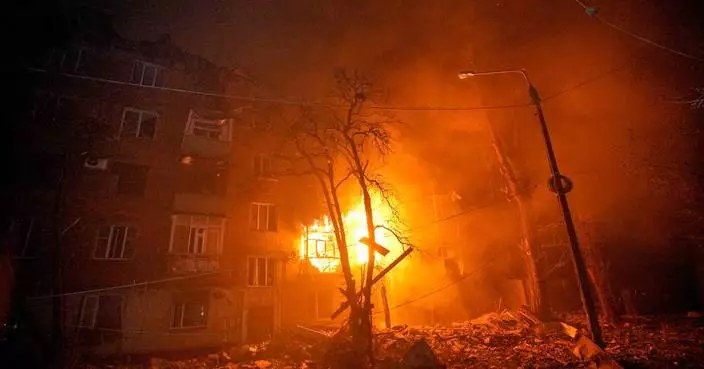Feature · News

Internet services partially resume, sufficient daily supplies available in Iran's Tehran
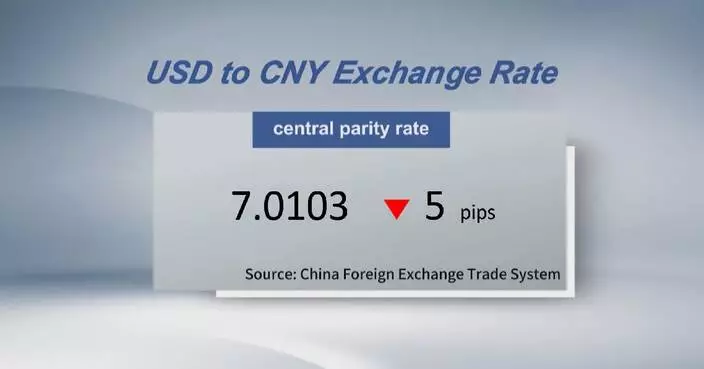
Chinese yuan strengthens to 7.0103 against USD Tuesday

Traffic operating normally, internet remains restricted in Tehran

Xi emphasizes commitment to multilateralism, cooperation in latest diplomatic engagements

Chinese yuan hits 32-month high against US dollar

China welcomes foreign enterprises, long-term capital to continue expanding investment in China: vice premier
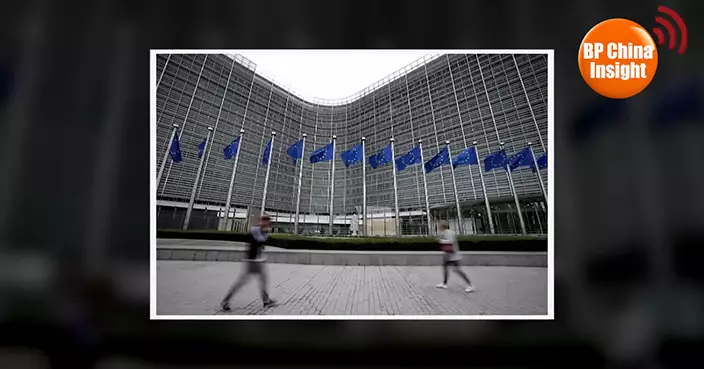
BP China Insight : Trump's Actions Have Turned the EU into an Outdated Relic of History

BP China Insight : Beijing Strikes Back at Meta's "Grab Tech and Talent" Acquisition

HK Express Soars as World's Safest Budget Airline Again
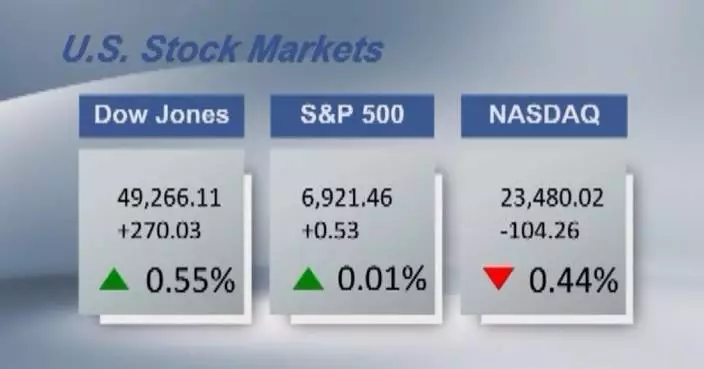
U.S. stocks close higher amid criminal probe into Fed chair Powell

DOJ investigation of Fed Chair Powell sparks backlash, support for Fed independence

Pentagon is embracing Musk's Grok AI chatbot as it draws global outcry

Minnesota, Illinois sue Trump administration over surge of federal immigration enforcement

Mississippi man accused of killing 6 people, including a 7-year-old, pleads not guilty

Court says Trump admin illegally blocked billions in clean energy grants to Democratic states

The Gavel vs. The Sanction: Hong Kong’s Judiciary Stands Firm

BP China Insight : Trump's Actions Have Turned the EU into an Outdated Relic of History

BP China Insight : Beijing Strikes Back at Meta's "Grab Tech and Talent" Acquisition

HK Express Soars as World's Safest Budget Airline Again
U.S. stocks close higher amid criminal probe into Fed chair Powell
Internet services partially resume, sufficient daily supplies available in Iran's Tehran
Chinese yuan strengthens to 7.0103 against USD Tuesday
Traffic operating normally, internet remains restricted in Tehran
Xi emphasizes commitment to multilateralism, cooperation in latest diplomatic engagements
Chinese yuan hits 32-month high against US dollar
China welcomes foreign enterprises, long-term capital to continue expanding investment in China: vice premier

DOJ investigation of Fed Chair Powell sparks backlash, support for Fed independence

Pentagon is embracing Musk's Grok AI chatbot as it draws global outcry
Minnesota, Illinois sue Trump administration over surge of federal immigration enforcement

Mississippi man accused of killing 6 people, including a 7-year-old, pleads not guilty

Court says Trump admin illegally blocked billions in clean energy grants to Democratic states

The Gavel vs. The Sanction: Hong Kong’s Judiciary Stands Firm
Feature·Bloggers

【Deep Blue】International Laws? You Kidding Me?

【Bastille Commentary】Chicken-hearted Conservatives: Sanctioning Hong Kong Judges While Trump Runs Wild

【What Say You?】Trump’s “Maduro Grab” Gets a Glossy Spin by the Usual Suspects

【What Say You?】Trump's Judicial Theater: Maduro's Fate Already Sealed

【Deep Throat】Trump's Venezuelan Oil Grab: Big Oil Not Playing Along?

The Most Laughable Lie of the New Year: Jimmy Lai's "Grave Illness" Falls Apart Under Five Hard Facts

Marine Le Pen's appeal trial opens in Paris, with far-right leader's 2027 presidential bid at stake
- MATERIAL Unleashes Formless Energy, Defying the Laws of Industrial Gravity
- Kincell Bio Advances Key Leaders to Accelerate Innovations for Reliable, High Quality Patient Supply in Cell Therapy Manufacturing
- Russia launches another major strike on Ukraine's power grid in freezing temperatures
- Howling winds send walls crashing down on Gaza tent camps, killing 4
- Freezing rain and ice disrupt travel across central and eastern Europe
- The Latest: Iran eases some restrictions, allows calls abroad as death toll spikes
- Soluna Announces Monthly Business Update
- Adair & Company Appoints Kim Killian as Chief Revenue Officer to Scale Client Impact Nationwide
- Blackline Safety Introduces G8—The Most Connected Safety Wearable Ever Made

China's new trade-in program sparks consumption boom
- Economy remains primary issue as presidential election draws close in Uganda
- US, Iran must rebuild trust before diplomacy can succeed: expert
- Nigeria petrol price cuts ease living costs, raise durability concerns
- Chicago expands housing supply to ease affordability pressure
- Turpan City in Xinjiang hit by continuous heavy fog
- Traditional treatments, advanced equipment on China's navy hospital ship wow Brazilian visitors
- Cold wave triggers temperature dips, snowfall in northwest China's Xinjiang
- Takaichi's erroneous remarks push Japan toward war, violate constitution: expert
- China ready to serve as booster for Africa's development, revitalization: spokeswoman

Mars names new Global Petcare President
- Meet Insta360 Link 2 Pro & Link 2C Pro: AI 4K Webcams for Professional-Grade Video and Audio
- YY Group Holding Strengthens Organizational Foundation with New Group-Level Learning & Organizational Development Function
- KGI: 2026 Global Market Outlook
- Bellroy Releases Year of the Horse Capsule Collection
- Top central bankers express 'full solidarity' with Fed Chair Powell in clash with Trump
- BBSB International Limited Trading Debut Closed at HK$0.67 Per Share
- Malaysia will take legal action against Musk's X and xAI over misuse of Grok chatbot
- French farmers drive 350 tractors to Parliament to protest low incomes and EU trade deal
- NYC nurses strike enters second day as hospitals move to fill labor gaps

People inside Iran describe heavy security and scattered damage in first calls to outside world
- Apple calls on Google to help smarten up Siri and bring other AI features to the iPhone
- Meta names former Trump adviser Dina Powell McCormick as president and vice chairman
- Malaysia and Indonesia become the first countries to block Musk’s Grok over sexualized AI images
- Google teams up with Walmart and other retailers to enable shopping within Gemini AI chatbot
- VR headsets are 'hope machines' inside California prisons, offering escape and practical experience
- Doctors say changes to US vaccine recommendations are confusing parents and could harm kids
- Strength training is crucial after menopause. How to make the most of your workouts
- Meta lines up massive supply of nuclear power to energize AI data centers
- From climbing vacuums to cyber pets: Some highlights of CES 2026

The BBC seeks to dismiss Trump's $10B defamation lawsuit in a Florida court
- Hong Kong court moves closer to sentencing activist Jimmy Lai after hearing lighter penalty pleas
- Adelaide Writers Week canceled as 180 speakers withdraw after the exclusion of a Palestinian writer
- PBS weekend newscasts shut down due to funding cuts, replaced by single-topic programs
- 'Joe Dirt' tribute takes top prize in Pennsylvania Farm Show mullet contest
- Music honcho L.A. Reid settles with ex-recording executive who accused him of sexual assault
- Celebrities embrace black and old Hollywood glamour for Golden Globes red carpet
- Milan prison hosts concert with instruments made by inmates from migrant smugglers’ boats
- Celebrity birthdays for the week of Jan. 18-24 includes Mariska Hargitay and Dolly Parton
- Inside the Golden Globes: The reunions and moments the telecast didn't show

Olympic snowboard medalist Ueli Kestenholz dies in Swiss avalanche at age 50
- How will climate change reshape the Winter Olympics? The list of possible host sites is shrinking
- Tottenham midfielder Bentancur has hamstring surgery in worry for Uruguay ahead of World Cup
- Supreme Court takes up culture war battle over transgender athletes in school sports
- Trump travel ban leaves Senegal, Ivory Coast fans in limbo for World Cup
- It's been a predictably tough year for Indiana, even with Pascal Siakam playing like an All-Star
- Two more Russian athletes approved for Milan Cortina Olympics with neutral status
- Venus Williams loses in 1st round of Australian Open tuneup event in Hobart
- Gael Monfils loses in 1st round in Auckland in likely his farewell season
- NFL's wild-card weekend was full of fourth-down fun and folly along with a dearth of punts

Hong Kong and Mainland China Strengthen Healthcare Collaboration with New Agreements on Chinese Medicine and Cancer Prevention.
- Severe pediatric influenza case prompts urgent vaccination reminder from health authorities.
- New 468 Employment Rule Enhances Part-Timer Rights, Effective January 18, Says Labour Secretary Chris Sun.
- SWD Celebrates Outstanding Carers at Hong Kong's Care the Carers Campaign Ceremony
- Hospital Authority Launches Phase II of Community Health Training Project with National Health Commission and Chow Tai Fook Foundation.
- Fire Services Inspect Buildings for Safety Violations, Issuing 32 Notices and One Prosecution Amid Public Concern.
- Go! Illustrators Finale Celebrates Emerging Hong Kong Picture Book Talent at International Book Fair
- Hong Kong Releases January Gravidtrap Indexes for Aedes Albopictus, Most Areas Report 0% Infestation.
- Hong Kong Records Serious Pollution Levels; Health Risks Alert Issued for Vulnerable Groups
- HKMA Warns Public About Fraudulent Banking Websites and Scams

Former Fed chairs, US officials decry criminal probe against Jerome Powell
- Chinese shares close lower Tuesday with record single-day A-share trading turnover
- Restaurants in Ningbo see surge in bookings for Chinese New Year's Eve dinners
- Chinese FM says it's opportune time for China, AU to enhance strategic mutual trust, cooperation
- U.S. State Department revokes over 100,000 visas in 2025
- First innovative robot traffic police officer put on duty in east China city
- Hong Kong stocks close higher
- Throughput of SCO int'l logistics park in Lianyungang hits 84 mln tonnes in 2025
- U.S. airstrike on Venezuela's La Guaira port has lasting impact on trade: logistics platform
- China urges efforts conducive to peace, stability in Middle East
Category · News

Marine Le Pen's appeal trial opens in Paris, with far-right leader's 2027 presidential bid at stake

MATERIAL Unleashes Formless Energy, Defying the Laws of Industrial Gravity

Kincell Bio Advances Key Leaders to Accelerate Innovations for Reliable, High Quality Patient Supply in Cell Therapy Manufacturing

Mars names new Global Petcare President

YY Group Holding Strengthens Organizational Foundation with New Group-Level Learning & Organizational Development Function

Meet Insta360 Link 2 Pro & Link 2C Pro: AI 4K Webcams for Professional-Grade Video and Audio

Hong Kong and Mainland China Strengthen Healthcare Collaboration with New Agreements on Chinese Medicine and Cancer Prevention.
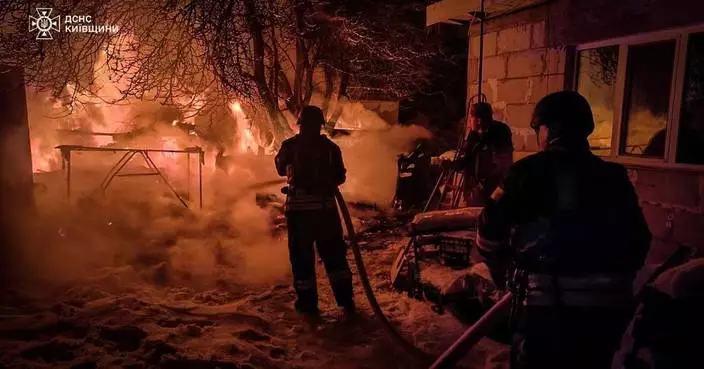
Russia launches another major strike on Ukraine's power grid in freezing temperatures

Severe pediatric influenza case prompts urgent vaccination reminder from health authorities.

Olympic snowboard medalist Ueli Kestenholz dies in Swiss avalanche at age 50
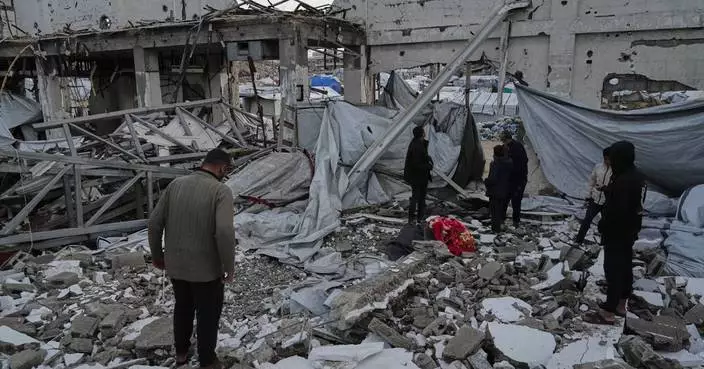
Howling winds send walls crashing down on Gaza tent camps, killing 4

Freezing rain and ice disrupt travel across central and eastern Europe

The Latest: Iran eases some restrictions, allows calls abroad as death toll spikes
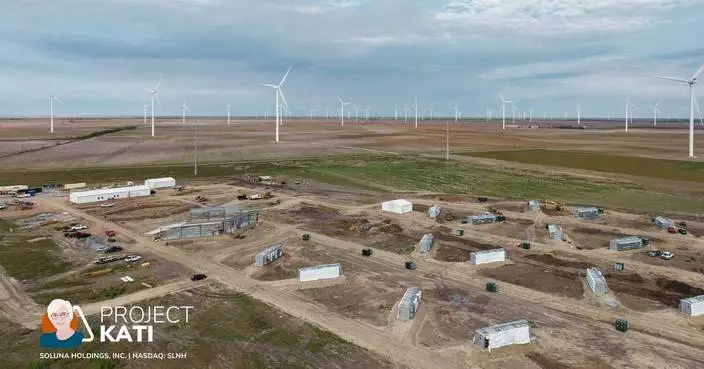
Soluna Announces Monthly Business Update

How will climate change reshape the Winter Olympics? The list of possible host sites is shrinking

Tottenham midfielder Bentancur has hamstring surgery in worry for Uruguay ahead of World Cup

Adair & Company Appoints Kim Killian as Chief Revenue Officer to Scale Client Impact Nationwide

Blackline Safety Introduces G8—The Most Connected Safety Wearable Ever Made
China's new trade-in program sparks consumption boom
Economy remains primary issue as presidential election draws close in Uganda

Americhem to Spotlight New Materials Addressing PFAS, Traceability, and Performance Demands in Medical Devices at Pharmapack and MD&M West 2026

HEINZ Unveils the First Fry Box with a Built-In Condiment Compartment in Eleven Countries Across the Globe

Dollar Tree Appoints Daniel Delrosario as Senior Vice President of Investor Relations and Treasurer

Bellroy Releases Year of the Horse Capsule Collection

KGI: 2026 Global Market Outlook

The BBC seeks to dismiss Trump's $10B defamation lawsuit in a Florida court

Supreme Court takes up culture war battle over transgender athletes in school sports

Top central bankers express 'full solidarity' with Fed Chair Powell in clash with Trump

New 468 Employment Rule Enhances Part-Timer Rights, Effective January 18, Says Labour Secretary Chris Sun.

BBSB International Limited Trading Debut Closed at HK$0.67 Per Share

SWD Celebrates Outstanding Carers at Hong Kong's Care the Carers Campaign Ceremony

Hospital Authority Launches Phase II of Community Health Training Project with National Health Commission and Chow Tai Fook Foundation.

Malaysia will take legal action against Musk's X and xAI over misuse of Grok chatbot

French farmers drive 350 tractors to Parliament to protest low incomes and EU trade deal

NYC nurses strike enters second day as hospitals move to fill labor gaps

Trump will visit a Ford factory and promote manufacturing in Detroit

Robotin R2 Pro Sweeps "Best of CES" Awards; Heralds a New Era in 150-Year History of Carpet Washing

Trump travel ban leaves Senegal, Ivory Coast fans in limbo for World Cup

Experian’s New Fraud Forecast Warns Agentic AI, Deepfake Job Candidates and Cyber Break-Ins Are Top Threats for 2026

Apprise by Walker & Dunlop Names Nelson Pratt to Lead Expanded HUD/FHA Multifamily Valuation Capabilities

Wisconsin Gov. Evers casts doubt on his lieutenant governor's ICE proposal

Gov. Tony Evers urges the Wisconsin Legislature to act on his key priorities in his final year

People inside Iran describe heavy security and scattered damage in first calls to outside world

It's been a predictably tough year for Indiana, even with Pascal Siakam playing like an All-Star

NETSCOUT Receives Frost & Sullivan's 2025 Global Company of the Year Recognition for Network Monitoring Leadership

Syrian army declares a closed military zone east of Aleppo as tensions rise with Kurds

Fire Services Inspect Buildings for Safety Violations, Issuing 32 Notices and One Prosecution Amid Public Concern.

Go! Illustrators Finale Celebrates Emerging Hong Kong Picture Book Talent at International Book Fair

US carbon pollution rose in 2025. Experts blame cold winter, high natural gas prices, data centers

ROE Visual Celebrates 20 Years of Pioneering LED Technology
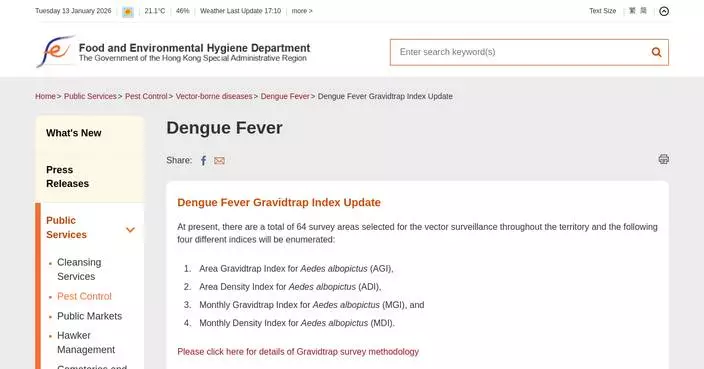
Hong Kong Releases January Gravidtrap Indexes for Aedes Albopictus, Most Areas Report 0% Infestation.

Ant International Powered Over 2 Billion Transactions in its Core Emerging Markets in 2025, Expanding AI Payments and Digital Commerce Tools for Inclusive Growth

Hong Kong court moves closer to sentencing activist Jimmy Lai after hearing lighter penalty pleas
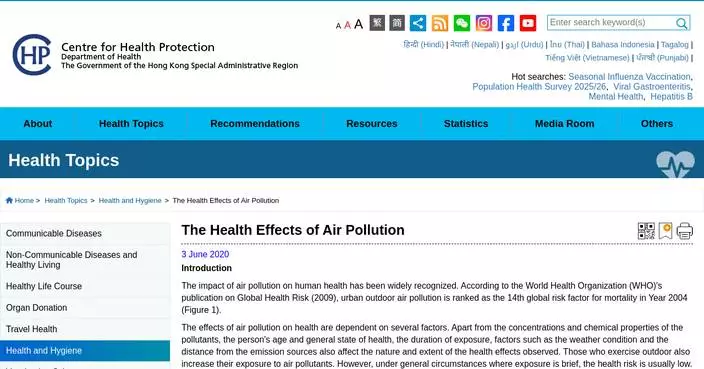
Hong Kong Records Serious Pollution Levels; Health Risks Alert Issued for Vulnerable Groups

Cosmo Announces Leadership Transition; Mark Griffie appointed as Chief Executive Officer

HKMA Warns Public About Fraudulent Banking Websites and Scams
US, Iran must rebuild trust before diplomacy can succeed: expert

aulumu Showcases High-Performance Design Philosophy at CES 2026 with G09 and M10
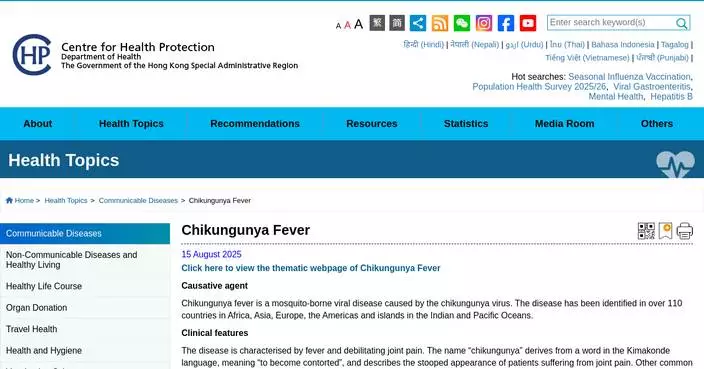
Hong Kong Reports No New Chikungunya Fever Cases Amid Ongoing Mosquito Control Efforts
Nigeria petrol price cuts ease living costs, raise durability concerns

Contractor Suspended After Fatal Incident at Kai Tak Construction Site: DEVB Takes Action on Safety Compliance.
Chicago expands housing supply to ease affordability pressure
Turpan City in Xinjiang hit by continuous heavy fog
Traditional treatments, advanced equipment on China's navy hospital ship wow Brazilian visitors
Cold wave triggers temperature dips, snowfall in northwest China's Xinjiang
Takaichi's erroneous remarks push Japan toward war, violate constitution: expert

China ready to serve as booster for Africa's development, revitalization: spokeswoman
Chinese shares close lower Tuesday with record single-day A-share trading turnover
Former Fed chairs, US officials decry criminal probe against Jerome Powell
Restaurants in Ningbo see surge in bookings for Chinese New Year's Eve dinners
Chinese FM says it's opportune time for China, AU to enhance strategic mutual trust, cooperation

Hong Kong Customs Cracks Down on Unlicensed Money Services via Social Media, Arresting 24 Individuals in 2025.
First innovative robot traffic police officer put on duty in east China city
U.S. State Department revokes over 100,000 visas in 2025

China ready to take all necessary moves to ensure citizens' safety in Iran: spokeswoman
Hong Kong stocks close higher

China to firmly safeguard legitimate rights, interests amid U.S. tariff threats: spokeswoman
Throughput of SCO int'l logistics park in Lianyungang hits 84 mln tonnes in 2025
U.S. airstrike on Venezuela's La Guaira port has lasting impact on trade: logistics platform

Two more Russian athletes approved for Milan Cortina Olympics with neutral status

SMEs' Business Sentiment Improves in December 2025, Shows Monthly Survey Results
China urges efforts conducive to peace, stability in Middle East

Venus Williams loses in 1st round of Australian Open tuneup event in Hobart
Hainan's Sanya opens first national dental specialty center













